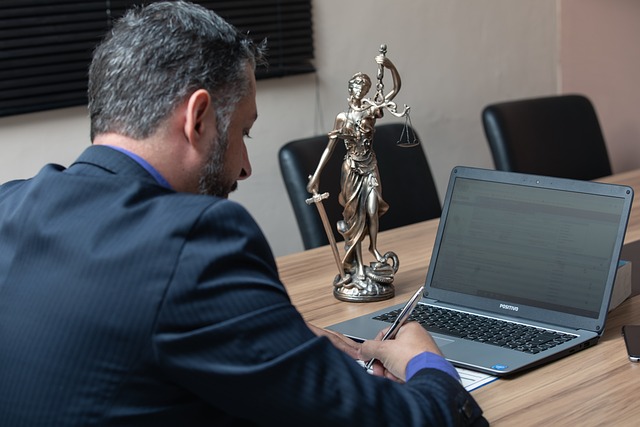Criminal Defense Attorneys play a vital role in upholding justice during criminal trials, focusing on protecting the rights of the accused. They expertly navigate the voir dire process, meticulously screening potential jurors to ensure an unbiased trial outcome. This strategic jury selection is crucial for fair justice, as it safeguards against biases influencing decisions. By employing strategic tactics throughout the general criminal defense process, these attorneys protect their clients' interests and ensure due process, aiming for the complete dismissal of charges when appropriate. Effective voir dire is a pivotal strategy for successful defense in complex cases like white-collar crimes, ensuring impartial jurors who objectively evaluate evidence and ultimately achieve favorable trial outcomes.
Criminal Defense Attorneys play a pivotal role in our justice system, ensuring fair trials through robust legal representation. Understanding their intricate responsibilities is crucial, especially when examining the jury selection process. This article delves into the significance of ‘voir dire’, its impact on criminal trials, and provides insights into effective strategies. We explore real-life case studies demonstrating how competent voir dire can sway verdicts. Recognizing the importance of this procedural step is key to upholding the integrity of our legal system.
- Understanding the Role of Criminal Defense Attorneys
- The Process of Voir Dire Explained
- Significance of Effective Voir Dire in Jury Selection
- Strategies and Techniques for Successful Voir Dire
- Case Studies: When Voir Dire Makes a Difference
Understanding the Role of Criminal Defense Attorneys
Criminal Defense Attorneys play a pivotal role in ensuring justice is served during criminal trials. Their primary duty is to protect the rights of the accused, who may be facing severe consequences if convicted. One of the key aspects of their role is mastering the art of voir dire, a crucial process in selecting an impartial jury. During voir dire, attorneys carefully examine potential jurors, allowing them to ask questions and gauge biases or prejudices that could influence the trial outcome. This meticulous screening is essential for achieving a fair trial, as it ensures the jury remains unbiased and can make decisions based solely on the evidence presented.
Moreover, these attorneys navigate all stages of the general criminal defense, from the initial investigation to the final verdict. They have a comprehensive understanding of the law and work diligently to build robust defenses, challenging the prosecution’s evidence and presenting mitigating circumstances that could lead to the complete dismissal of all charges. By employing strategic tactics throughout the all stages of the investigative and enforcement process, they safeguard their clients’ interests, ensuring due process is followed and every legal option is explored.
The Process of Voir Dire Explained
The process of voir dire is a critical phase in any criminal trial, playing a pivotal role in ensuring a fair and just verdict. It involves a thorough examination of potential jurors to determine their suitability and impartiality for the case at hand. During this meticulous process, attorneys from both sides—prosecution and defense—have the opportunity to question prospective jurors individually, exploring their backgrounds, experiences, and biases. This questioning aims to uncover any preconceived notions or prejudices that might influence their decision-making during the trial.
Understanding the importance of voir dire in criminal trials is paramount for achieving winning challenging defense verdicts. For corporate and individual clients alike, a successful defense strategy begins with selecting a jury that can approach the case with an open mind and base their decisions solely on the evidence presented. By effectively utilizing voir dire, criminal defense attorneys can ensure the complete dismissal of all charges, thereby safeguarding their clients’ rights and interests.
Significance of Effective Voir Dire in Jury Selection
Effective voir dire is a cornerstone of successful criminal defense strategy. During this critical phase in jury selection, attorneys have the opportunity to assess potential jurors’ biases, prejudices, and life experiences that could influence their ability to render an impartial verdict. By probing into these areas through careful questioning, defense counsel can ensure a fair and unbiased panel for their client’s trial. This process goes beyond simply identifying obvious disqualifiers; it involves delving into the nuances of potential jurors’ perspectives on key issues likely to arise in the case, such as law enforcement credibility or the impact of criminal history.
In the context of white-collar and economic crimes, where complex legal arguments and nuanced interpretations of evidence are common, effective voir dire becomes even more critical. A well-conducted jury selection process allows defense attorneys to identify jurors who can fairly evaluate the intricacies of these cases, ensuring a panel capable of grasping subtleties in financial records, understanding complex regulatory environments, and discerning motive in corporate settings. This is particularly vital in white-collar defense, where outcomes often hinge on the jury’s ability to navigate intricate legal landscapes and the nuances of economic motivations.
Strategies and Techniques for Successful Voir Dire
The voir dire process is a critical component in criminal trials, offering a crucial opportunity for attorneys to ensure a fair jury selection. Successful strategies during this phase can significantly impact the outcome of high-stakes cases, whether involving corporate and individual clients or complex matters like white-collar and economic crimes. By carefully questioning potential jurors, defense attorneys can uncover biases, prejudices, or any connection to law enforcement that might influence their decision-making. This strategic approach aims to create a jury pool composed of impartial individuals who can objectively evaluate the evidence presented during the trial.
Effective voir dire techniques involve asking thoughtful questions, observing body language, and listening attentively to the jurors’ responses. Attorneys should delve into potential biases related to criminal justice issues, past experiences with law enforcement, or any personal beliefs that could cloud their judgment. For instance, inquiring about their understanding of different legal terms or their perception of specific types of crimes can provide valuable insights. This process allows defense lawyers to challenge or strike jurors who may not be able to render an unbiased verdict, thereby ensuring a fair and just trial for all parties involved.
Case Studies: When Voir Dire Makes a Difference
Voir dire is a critical phase in any criminal trial where the judge and attorneys select an impartial jury from potential witnesses. This process goes beyond merely choosing individuals; it’s about uncovering biases, prejudices, and experiences that could influence their decision-making during deliberations. In the context of white-collar and economic crimes cases, where nuances and complex financial details often play a significant role, effective voir dire can be a game-changer for criminal defense attorneys.
By skillfully questioning potential jurors, defense lawyers can ensure that their clients receive a fair trial. This involves delving into their past experiences, understanding their perspectives on various legal issues, and gauging how they might react to specific scenarios presented during the case. For instance, in challenging economic crimes cases, an attorney might explore a juror’s financial background or their views on corporate responsibility, enabling them to make informed decisions that lead to winning challenging defense verdicts. This strategic approach underscores the importance of voir dire in shaping the outcome of criminal trials.
Criminal defense attorneys play a pivotal role in ensuring a fair and just legal process, and understanding the intricacies of voir dire is key to their success. As demonstrated through various case studies, the effective use of voir dire during jury selection can significantly impact trial outcomes. This strategic questioning process allows attorneys to uncover potential biases, ensure an impartial jury, and ultimately protect their client’s rights. The importance of voir dire in criminal trials cannot be overstated; it is a powerful tool that enables lawyers to navigate complex legal landscapes, ensuring the integrity of our justice system.






